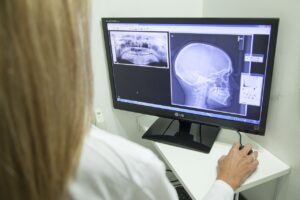Avascular Necrosis a.k.a. Osteonecrosis
What is avascular necrosis?
Avascular necrosis, which is also known as osteonecrosis, is a rare disease characterized by reduced blood flow to bones in the joints, leading to bone tissue death. Avascular necrosis is associated with long-term use of high-dose steroid medications and excessive alcohol intake.
What causes avascular necrosis?
Avascular necrosis occurs when blood flow to a bone is interrupted or reduced. Reduced blood supply can be caused by any of the following factors:
- Joint or bone trauma
- Fatty deposits in blood vessels
- Certain diseases, such as:
- Sickle cell anemia
- Gaucher disease
- Pancreatitis
- Diabetes
- HIV/Aids
- Systemic lupus erythematosus
For about 25 percent of people with avascular necrosis, the cause of interrupted blood flow is unknown. Long-term steroid treatment and alcohol abuse may also be factors.
What are the symptoms of avascular necrosis?
People in the early stages of avascular necrosis may not have any symptoms. However, as the disorder progresses, most people will experience some joint pain. Pain can be mild or severe and usually develops gradually. Pain associated with avascular necrosis of the hip may be focused in the groin, thigh or buttock. In addition to the hip, the areas most likely to be affected are the shoulder, knee, hand, and foot.
How is avascular necrosis diagnosed?
A diagnosis of avascular necrosis can be reached via:
- Imaging texts (e.g. CAT scans)
- Bone scans
- Radiography
What are the available treatments for avascular necrosis?
The goal os avascular necrosis treatment is to prevent further bone loss. Specific treatment usually depends on the amount of bone damage the patient already has. These treatments may include:
- Nonsteroidal anti-inflammatory drugs
- Osteoporosis drugs
- Cholesterol-lowering drugs
- Blood thinners.
Surgical treatments may also be recommended and can include:
- Core decompression
- Bone transplant
- Bone reshaping
- Joint replacement
Where can I find out more about avascular necrosis?
Avascular Necrosis Articles


Denosumab Proves to Increase Risk of Osteonecrosis of the Jaw Compared to Bisphosphonates

Osteoporosis/Osteonecrosis and Their Relation to Bisphosphonate Medications

New Study Determines Risk Factors for Osteonecrosis of The Jaw

Increased Risk of Osteonecrosis in Lupus May be Caused by Prednisone

Osteoporosis Patients: Want To Take a Drug Holiday from Bisphophonates?

New Study Shows Potential to Eliminate Osteonecrosis Risk in Osteoporosis and Brain Cancer Patients





